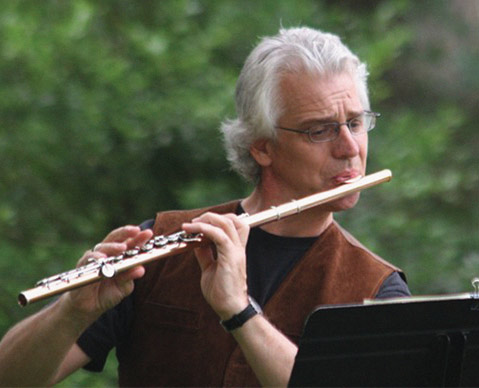St. Louis Symphony with Mark Sparks
Flutist Mark Sparks Champions a Great American Concerto

As Santa Barbara audiences are well aware, touring orchestras generally tend to stick to the standard repertoire. So it was a bit startling when CAMA announced the program for its concert by the St. Louis Symphony, which will take place Wednesday, March 20, at the Granada Theatre.
There, as the centerpiece, is a work written in the early ’90s — the 1990s, that is. In between familiar compositions by Richard Strauss, David Robertson will conduct the big, sprawling Flute Concerto of Christopher Rouse, current composer-in-residence with the New York Philharmonic.
“Playing this piece, I feel I’m going on a journey through some sort of haunted house,” said principal flutist Mark Sparks, who will be the soloist in the 30-minute-long work. “It’s a sunny, beautiful day outside. Then you enter the hall of mirrors, and everything gets fractured.
“You see all these dark images, like a witches’ Sabbath with all this wild dancing, and then you emerge back out into the light. At the end of the piece, you’re not sure if you’re still in the dream or not.”
It is indeed a remarkable work, dissonant and angular in spots, elegiac and achingly beautiful in others. Its anguished middle movement was a response to a tragedy that had recently been in the news: the murder of a 2-year-old British boy by two 10-year-olds.
“In a world of daily horrors,” Rouse said at the time of the 1993 premiere, “it is sometimes only isolated, individual tragedies which serve to sensitize us to the potential harm that man can do to his fellow man.”
“I think one reason that audiences like it is the piece is very approachable,” said Sparks. “The way he described it to me, when he wrote this piece, his heart just opened. It’s definitely influenced by the music of the British Isles, but it has a lot of other dimensions and travels to a lot of other places.”
Sparks and Rouse are both on the faculty of the Aspen Music Festival, and the flutist learned about the concerto one summer directly from the composer. “We talked about my performing it at some point,” he recalled. “Then I heard one of my colleagues play it. I was taken by it, so I started learning it.”
He first performed it with Robertson and the orchestra six seasons ago and had such a great time he suggested reviving it this year. “It’s really fun to play,” he said. “It’s very well-written for the instrument.
“It’s a big concerto that uses a large orchestra. A lot of times, the music written for our instrument is of a lighter nature. This opens up a whole new world. I can’t think of another flute concerto on this scale.”
And Sparks, 53, has played a lot of concertos. He started playing the flute at age 7, after an unsatisfying year or so of piano lessons.
“I don’t know [what attracted me to the instrument],” he said. “Sometimes something special finds you; you don’t find it. That’s what it’s like with this career. You can’t force it. That’s what happened to me.”
To some extent, his talent is inherited: His father, a biomedical engineer, was a tenor who sang in major choruses. “He was a great whistler, too,” Sparks said. “A virtuoso! He constantly whistled. I think that may have had something to do with my love of music.”
Sparks spent his early childhood in Cleveland and his high school years in St. Louis. “I grew up listening to the same orchestra I play in now,” he said. “It’s a fantastic orchestra with a great history. I always wanted to be part of something like that. I have a dream job.”
That’s especially true when he gets to play the Rouse concerto. “It’s my favorite piece to play with an orchestra,” he said. “You can work on it for the rest of your life — and I might!”
4•1•1
The St. Louis Symphony will perform at 8 p.m. on Wednesday, March 20, at the Granada Theatre (1214 State St.). For tickets and information, call (805) 899-2222 or visit granadasb.org.



